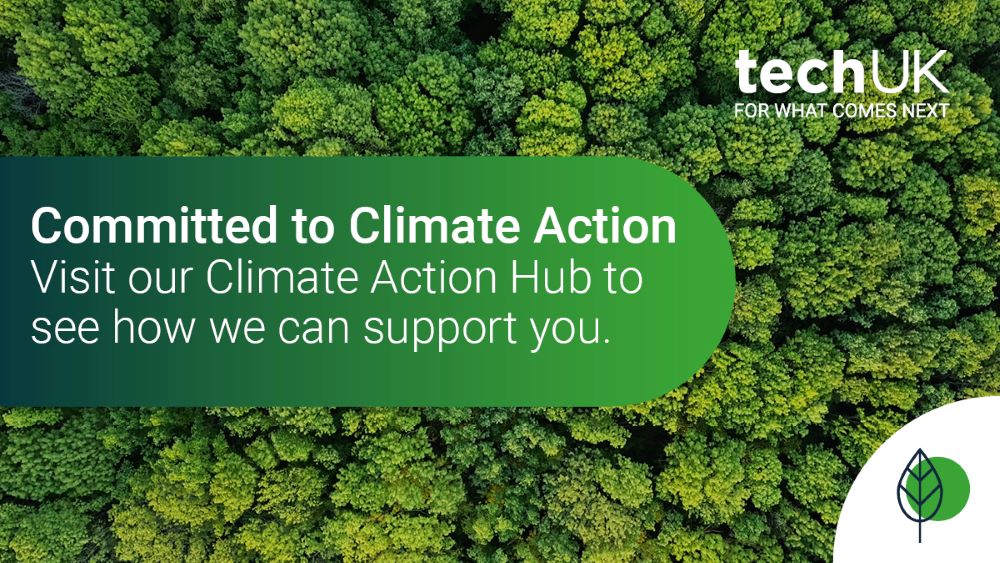techUK COP30 roundup: tech and digital come to the forefront of the climate agenda
Background
Going into the 30th annual Conference of the Parties (COP30), host country Brazil identified three primary goals for the gathering: reinforcing multilateralism and cooperation; connecting climate change to individuals and the economy; and accelerating implementation – thus dubbing it the “Implementation COP”, as identified at the New York Climate Week. Despite a chaotic mixture of extreme weather and geopolitical tensions, the final Global Mutirão (“collective effort”) Decision has already been hailed for some surprising successes on the just transition and climate finance – but with separate work to be done on phasing out fossil fuels and stopping deforestation.
Taking place from 10-21 November 2025 in Belém, Brazil, the momentous yet controversial COP30 fundamentally aimed to highlight the need to talk less and do more. Notably, technology was hailed as a “strategic ally” in addressing the climate crisis, with a dedicated “Green Tech stream” at the conference – more on that below!
Held on the doorstep of the Amazon Rainforest, nature also came out as a key theme, as indigenous and local community groups gain visibility, and nations recognise the long-term economic value of “natural capital”.
Marking 10 years since the landmark 2015 Paris Climate Accords, signatory countries were also required to submit their third Nationally Determined Contributions (NDC) reports to the UN this year, outlining how they plan to reduce greenhouse gas emissions to help meet the global goal of limiting temperature rise to 1.5ºC. The UK was ahead of the game, submitting ours before the February 2025 deadline, but many other countries submitted theirs in the past few weeks, or not at all – meaning that the UN will ideally revise its 2025 assessment on whether the commitments will be enough to keep the world at 1.5 ºC warming with the new data.
However, achieving a stocktake of global action on climate change amidst a geopolitical landscape dominated by national economic pressures and security concerns was destined to be challenging. The dominating controversy from the Conference was whether to include mention of phasing out “fossil fuels” – with more climate-affected nations, such as Columbia and Vanuatu, as well as international climate leaders such as the EU and UK, pushing for its inclusion in the final text. On the other hand, countries with significant economic interest in the continued production of non-renewable energy sources, most notably Saudi Arabia, refused to allow the text or conference agenda to even mention the phrase.
Despite hours of talks and efforts from campaigners, the final text did not mention fossil fuels – but the Brazilian Presidency will be voluntarily leading work on a phase-out roadmap, to be reported back next year, and Columbia and the Netherlands will be co-hosting an International Conference in April next year.
Additionally, out of the world’s biggest polluters, the absence of the United States (and its withdrawal – again – from the Paris Agreement) weighed heavily on attendees. China and India both sent delegations but have been hesitant to step forward into any kind of leadership role, leaving a gap on the world stage and questions around what could be possible to achieve in the next few years.
For a full briefing, you can sign up to join techUK’s webinar on 8th December here.
A “strategic ally” of the green transition
The first day of the Conference, 10th November, was designated the “Science and Technology Day”, with discussions focusing on how technology can help people cope with the impacts of climate change, and the announcement of a variety of new initiatives.
Technology Implementation Program (TIP)
COP30 saw the approval (after much negotiation) of the new Technology Implementation Program (TIP), which aims to support developing countries implement climate technology priorities and address related challenges.
The programme will be funded by the Global Environment Facility (GEF) and the Green Climate Fund (GCF) and will be rolled out by 2034.
Green Digital Action Hub (GDA Hub)
Notably, the first day saw the launch of the Green Digital Action Hub (GDA Hub), developed off the back of the Declaration on Green Digital Action agreed last year at COP29.
The Hub is designed to be a “cooperation platform” to harness technological innovation which combats climate change, with a specific focus on aiding Global South countries, and becoming the “nerve centre” of Green Digital Action.
This will include providing tools, expertise and data to help countries scale green tech; reduce environmental footprint of existing technologies; and ensure equitable access to sustainable digital solutions. Specifically, this will include:
- Scaling solutions: Supporting innovation and technology transfer to help countries adopt and expand green digital strategies.
- Mapping national goals: Identifying green digital targets, strategies, and enablers, particularly within climate pledges (Nationally Determined Contributions) linked to the Paris climate accords.
- Accelerating decarbonisation plans: Serving as the implementation hub for the Digital Decarbonisation Plan to Accelerate Solutions (PAS) under the COP30 Action Agenda.
- Tracking emissions and e-waste: Launching an open-access portal to monitor greenhouse gas emissions, reductions, and e-waste data from tech companies and countries.
Artificial Intelligence (AI) Climate Institute
COP30 was the first conference to formally integrate AI as a central theme in the agenda.
This was solidified by the official launch of a new global initiative – the AI Climate Institute (AICI) – which aims to support people and governments in specifically Global South countries with the skills to harness AI for climate action.
The AICI will strive to promote AI as a tool of empowerment, helping countries to design, adapt, and implement their own AI-driven climate solutions, such as lightweight and low-energy models suitable for local contexts. The institute will offer training programmes (workshops for policymakers on AI concepts, climate data, and use case exploration; advanced Labs for technical professionals; hands-on experience in building real-world, resource-efficient AI applications), and a Digital Learning Repository with courses and case studies on climate applications across different sectors.
Global Implementation Accelerator
The new Global Implementation Accelerator will support countries to deliver on their NDCs, national adaptation plans and the Biennial Transparency Reports (BTRs), prioritising actions and interventions with the greatest impact.
This could include anything from initiatives around methane emission reduction and carbon removal through nature-based solutions, to employing more renewables and batteries, reducing the cost of capital, ongoing digitalisation, or multilateral bank reform.
Global Grids and Storage Coordination Council
The newly established Council was launched to implement the “Plan to Accelerate the Expansion and Resilience of Power Grids” and drive the implementation of the Global Energy Storage and Grids Pledge.
It confirmed aims to accelerate the expansion and resilience of global power grids and energy storage capacity to support the clean energy transition.
Additionally, the Utilities for Net Zero Alliance (UNEZA) announced an increase in its annual energy-transition investment plans, committing nearly £114bn (up from £89bn) with a major emphasis on power grids and storage. UNEZA, supported by the Green Grids Initiative (GGI) recently developed the Climate Finance Principles for Unlocking Grids Finance, which aims to “harmonise taxonomies, define quantitative eligibility criteria, and provide common guidance for how financial institutions assess and support grid investments” – this was specifically endorsed by the COP30 Presidency as part of the Action Agenda.
Other initiatives
Additional green digital highlights include progress on a global database to track tech-related emissions; a policy brief on digitalisation plans in national climate pledges; and the announcement of winners from two AI-focused competitions: the AI for Climate Action Innovation Factory and the AI Environmental Footprint Measurement Hackathon.
Tangentially, there was also a new commitment to counter mis- and disinformation and seek to address areas such as the impact of digital exclusion on inhibiting action.
Headline announcements
Overall, COP30 saw some significant wins for finance and human rights and nature, despite the notable weaknesses on deforestation and fossil fuels.
The final “Global Mutirão” text, or the Belém Package, finally included 29 decisions across he just transition, adaptation finance, trade, gender, and technology, reestablishing the international commitment toward “accelerated action”.
Despite only 70 countries submitting their NDCs by the end of October, by the last day of the Conference 122 countries had finally submitted their new pledges.
Climate finance
One of the biggest announcements was the commitment from “rich” countries to triple finance for poor countries to help them adapt to climate change – roughly $120bn (£91bn) of the $300bn (£228bn) climate finance goal will now be dedicated to adaptation measures in the most vulnerable countries. They also recommitted to the broader goal of $1.3tn (£986bn) a year from public and private sources over the same period.
However, some countries – particularly those on the receiving end – did question whether this goal would be possible without involvement from the United States, as well as when and how the money would be distributed. This is still murky and will likely be a topic in further negotiations.
Deforestation and nature
Some progress was made on tackling deforestation, most strikingly Brazil’s Tropical Forests Forever Facility (TFFF) receiving over $9bn (£7bn) in funding – however, this will hardly be enough to achieve its aims of halting deforestation and supporting local communities.
Many delegates were disappointed that the final text did not include specific commitments for deforestation Over the coming year, Brazil’s Presidency will lead the development of a Forest and Climate Roadmap, which will gather parties and stakeholders to discuss how to halt and reverse deforestation.
Broadly, 120 Plans to “Accelerate Solutions” were announced, encompassing initiatives focused on our energy systems, forests, oceans, and people’s daily lives.
Just transition, inclusion, and human rights
Notably, countries agreed the Belém Mechanism for Just Global Transition (also called the Belém Action Mechanism, BAM), which is designed to support countries in ensuring that the transition to sustainable economies is just and inclusive, shifting from fossil fuel-based economies in ways that support workers, protect communities, and broaden the economic benefits of clean energy.
The mechanism was welcomed as a victory by civil society and Global South countries, offering a “practical tool” for dealing with economic and social challenges of decarbonisation.
Additionally, a new Gender and Climate Action Plan was adopted, with activities to increase the influence of women in combating climate change. This was alongside unprecedented involvement from indigenous groups at COP30, who were highly visible over the course of the two weeks.
At the same time, some campaigners feel the measures did not go far enough, and that COP30 was still subject to the perennial problem of decisions being made by those who lacked understanding of how climate change is affecting people’s daily lives – a conflict which will likely come up again next year.
The UK at COP30
Overall, although the UK is still keen on presenting itself as a climate leader, there were few UK-specific announcements this year. With our main NDC commitment – to reduce all greenhouse gas emissions by at least 81% by 2035 compared to 1990 levels – announced last year, and the policy paper submitted to Parliament in January, the UK delegation focused primarily on the global energy transition, with commitments to move away from fossil fuels, with a secondary focus on emphasising ongoing work on nature and signing up to new commitments.
The UK was represented at the Conference by Energy Secretary Ed Miliband, as well as Nature Minister Mary Creagh, although a group of MPs from Labour, Conservative, and the Liberal Democrats also attended. Prime Minister Keir Starmer attended the pre-COP World Leader’s Summit, staying long enough to give a speech to highlight UK investment in renewable energy before heading back home to deal with his various domestic concerns.
The government announced that they have signed up to:
- Nature Markets Policy Forum: as part of the work of the Independent Advisory Panel on Biodiversity Credits (IABP), the UK, France and Indonesia have joined this Forum dedicated to unlocking innovation and investment in high integrity nature credit markets.
- Belém Declaration on Fertilisers: launched by the UK and Brazil, the Declaration urges for more to be done to enhance nutrient use efficiency and reduce emissions from fertiliser production as a key pathway to delivering climate goals, protecting and restoring nature, and ensuring food security for all in an equitable and just manner.
- Saltmarsh Breakthrough: the “Global Call to Action” was officially launched, which aims to protect coastal ecosystems which anchor key marine food chains, shield communities from floods and lock away more carbon than most forests.
- Food Waste Breakthrough: The UK is a “Country Champion” of the plan to halve food waste by 2030 and cut methane by keeping food waste out of landfills.
Ministers were also keen to note that the first company contributing to the Cali Fund, which supports biodiversity and conservation, was a British-based startup, Tierra Viva AI.
What Next
Brazil holds the presidency for the coming year, until the next meeting, and as such are responsible for ensuing their goal of “implementation” is realised. Colombia, which stood out this year as a strong voice for action, will be hosting a summit for countries interesting in the proposed fossil fuel plan.
This COP will certainly be remembered, but time will tell whether it has succeeded in setting the course in the right direction. The inability for countries to decide that phasing out fossil fuels is the way forward sets an uneasy precedent for a sustainable future, and delegates have come away noting the divisive atmosphere, and questioning how much was achieved in the end. Even the format of the conference – and its environmental impact – have been called into question, contending with a rapidly evolving social, economic and political global landscape.
On a more positive note, the recognition that tech and digital will be key to achieving the green transition is encouraging to see – particularly the focus on ensuring both Global North and South countries have access to digital tools and can scale tech for climate. As the world (slowly) transitions away from non-renewable energy sources, investment in renewables brings new opportunities and economic benefits for communities all over the world, and digital solutions will further transform the economy and society.
COP31 will be held in Antalya, Turkey, who will act as host and “COP31 president”, while Australia will be “president of negotiations”. The two countries will be expected to work together to ensure that next year’s Conference continues the “era of implementation” inaugurated by COP30, and drives further action across energy, finance, adaptation and resilience and governance.
techUK - Committed to Climate Action
Visit our Climate Action Hub to learn more or to register for regular updates.
By 2030, digital technology can cut global emissions by 15%. Cloud computing, 5G, AI and IoT have the potential to support dramatic reductions in carbon emissions in sectors such as transport, agriculture, and manufacturing. techUK is working to foster the right policy framework and leadership so we can all play our part. For more information on how techUK can support you, please visit our Climate Action Hub and click ‘contact us’.
Latest Report
Upcoming climate events
Latest news and insights
Get our climate insights straight to your inbox
Climate, Environment and Sustainability updates
Sign-up to get the latest updates and opportunities from our Climate, Environment and Sustainability programme.
Learn more about our Climate campaign

Become a member








